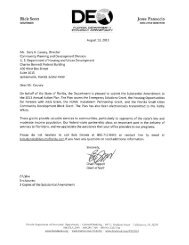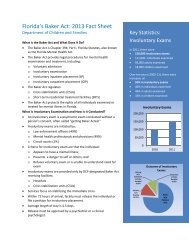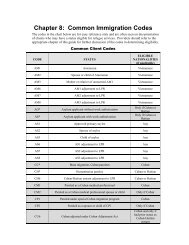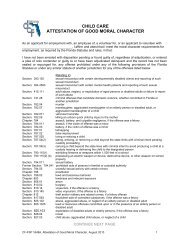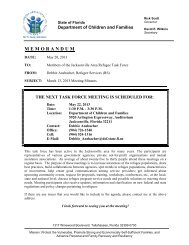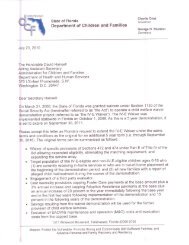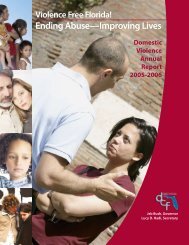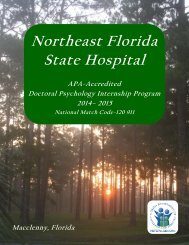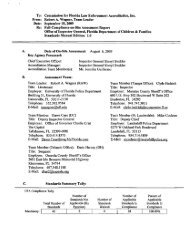The National Strategy for Child Exploitation Prevention and Interdiction
The National Strategy for Child Exploitation Prevention and Interdiction
The National Strategy for Child Exploitation Prevention and Interdiction
Create successful ePaper yourself
Turn your PDF publications into a flip-book with our unique Google optimized e-Paper software.
• Some American Indians who speak traditional languages may experience difficultycommunicating in English with federal law en<strong>for</strong>cement <strong>and</strong> in federal court.• Some American Indians who are unfamiliar with Anglo customs may be uncom<strong>for</strong>tableinteracting with law en<strong>for</strong>cement, prosecutorial, <strong>and</strong> court personnel duringinvestigations <strong>and</strong> trials. In some cases, victims <strong>and</strong> witnesses may have a tendency todistrust outsiders.<strong>Child</strong> sexual abuse potentially has many short-<strong>and</strong> long-term impacts on American Indianvictims <strong>and</strong> these potential problems frequently are exacerbated in Indian Country, where remotereservations result in isolation of the victims <strong>and</strong> their families <strong>and</strong> insufficient social services toassist victims with the effects of the abuse. Frequently reported short-term impacts include anger,hostility, low self-esteem, conduct disorders, delinquency, inappropriate sexual behavior, teenpregnancy, truancy, poor per<strong>for</strong>mance in school, substance abuse, <strong>and</strong> running away. Potentiallong-term impacts include sexual disturbance, depression, suicide, alcoholism, drug abuse,chronic unemployment, violence, <strong>and</strong> sexual abuse of others.<strong>The</strong> Department has authority to prosecute child exploitation crimes in Indian Countrypredicated on two main federal statutes that govern federal criminal jurisdiction in IndianCountry—18 U.S.C. § 1152 <strong>and</strong> § 1153. Section 1153, known as the Major Crimes Act, givesthe federal government jurisdiction to prosecute certain enumerated serious offenses, such asmurder, manslaughter, rape, aggravated assault, <strong>and</strong> child sexual abuse, when they arecommitted by Indians in Indian Country. Section 1152, known as the General Crimes Act, givesthe Federal Government exclusive jurisdiction to prosecute all crimes committed by non-Indiansagainst Indian victims. Section 1152 also grants the federal government jurisdiction to prosecuteminor crimes by Indians against non-Indians, although that jurisdiction is shared with tribes, <strong>and</strong>provides that the federal government may not prosecute an Indian who has been punished by thelocal tribe <strong>for</strong> a minor offense. To protect tribal self-government, section 1152 also specificallyexcludes minor crimes between Indians, which fall under exclusive tribal jurisdiction. <strong>The</strong>federal government also has jurisdiction to prosecute federal crimes of general application, suchas drug <strong>and</strong> financial crimes, when they occur in Indian Country. On a limited number ofreservations, the federal criminal responsibilities under Sections 1152 <strong>and</strong> 1153 have been cededto the states. 73<strong>The</strong> Department’s response to violent crime in Indian Country is in<strong>for</strong>med by the circumstancesof a tribe <strong>and</strong> the criminal justice issues confronting a particular reservation. <strong>The</strong> Department isfocused on the prosecution of cases, but also recognizes that prevention, training, <strong>and</strong> othergrassroots intervention ef<strong>for</strong>ts are vital <strong>for</strong> an effective solution to crime in Indian Country.<strong>The</strong>se other ef<strong>for</strong>ts are important in Indian Country where financial resources may be limited <strong>and</strong>an adequate support system is not in place.73 Federal jurisdiction was ceded under Public Law (Pub. L.) 83-280 (commonly referred to as Public Law 280), 18U.S.C. § 1162, which required six states to assume jurisdiction over Indian Country crimes <strong>and</strong> divested the federalgovernment of jurisdiction to prosecute under the Major <strong>and</strong> Indian Country Crimes Acts in those areas. Public Law280 also allowed other states the option to assume jurisdiction. Congress also has passed a variety of reservationspecificstatutes providing <strong>for</strong> a similar framework of state jurisdiction over crimes in those locations. <strong>The</strong> federalgovernment retains jurisdiction to prosecute generally applicable offenses in Public Law 280 areas.39



